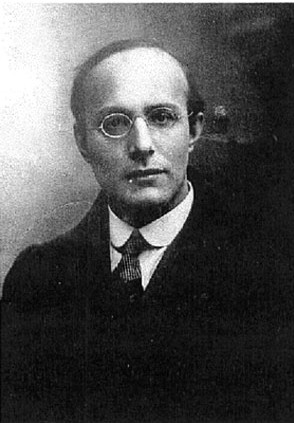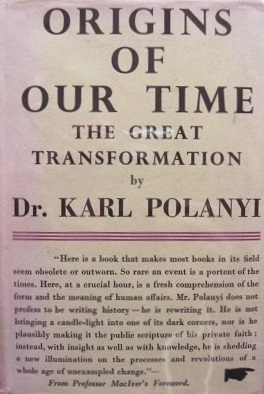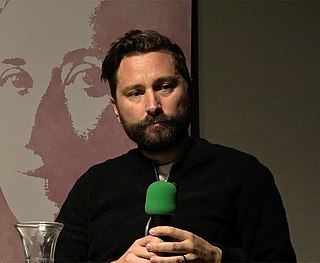Classical liberalism is a political tradition and a branch of liberalism that advocates free market and laissez-faire economics; civil liberties under the rule of law with special emphasis on individual autonomy, limited government, economic freedom, political freedom and freedom of speech. It gained full flowering in the early 18th century, building on ideas stemming at least as far back as the 16th century within the Iberian, Anglo-Saxon, and central European contexts and was foundational to the American Revolution and "American Project" more broadly.
In economics, a free market is an economic system in which the prices of goods and services are determined by supply and demand expressed by sellers and buyers. Such markets, as modeled, operate without the intervention of government or any other external authority. Proponents of the free market as a normative ideal contrast it with a regulated market, in which a government intervenes in supply and demand by means of various methods such as taxes or regulations. In an idealized free market economy, prices for goods and services are set solely by the bids and offers of the participants.

A market economy is an economic system in which the decisions regarding investment, production and distribution to the consumers are guided by the price signals created by the forces of supply and demand. The major characteristic of a market economy is the existence of factor markets that play a dominant role in the allocation of capital and the factors of production.
Laissez-faire is a type of economic system in which transactions between private groups of people are free from any form of economic interventionism. As a system of thought, laissez-faire rests on the following axioms: "the individual is the basic unit in society, i.e. the standard of measurement in social calculus; the individual has a natural right to freedom; and the physical order of nature is a harmonious and self-regulating system."
The social market economy, also called Rhine capitalism, Rhine-Alpine capitalism, the Rhenish model, and social capitalism, is a socioeconomic model combining a free-market capitalist economic system alongside social policies and enough regulation to establish both fair competition within the market and generally a welfare state. It is sometimes classified as a regulated market economy.
Market fundamentalism, also known as free-market fundamentalism, is a term applied to a strong belief in the ability of unregulated laissez-faire or free-market capitalist policies to solve most economic and social problems. It is often used as pejorative by critics of said beliefs.

Karl Paul Polanyi, was an Austro-Hungarian economic anthropologist, economic sociologist, and politician, best known for his book The Great Transformation, which questions the conceptual validity of self-regulating markets.
Spontaneous order, also named self-organization in the hard sciences, is the spontaneous emergence of order out of seeming chaos. The term "self-organization" is more often used for physical changes and biological processes, while "spontaneous order" is typically used to describe the emergence of various kinds of social orders in human social networks from the behavior of a combination of self-interested individuals who are not intentionally trying to create order through planning. Proposed examples of systems which evolved through spontaneous order or self-organization include the evolution of life on Earth, language, crystal structure, the Internet, Wikipedia, and a free market economy.
The nature of capitalism is criticized by left-wing anarchists, who reject hierarchy and advocate stateless societies based on non-hierarchical voluntary associations. Anarchism is generally defined as the libertarian philosophy which holds the state to be undesirable, unnecessary and harmful as well as opposing authoritarianism, illegitimate authority and hierarchical organization in the conduct of human relations. Capitalism is generally considered by scholars to be an economic system that includes private ownership of the means of production, creation of goods or services for profit or income, the accumulation of capital, competitive markets, voluntary exchange and wage labor which has generally been opposed by anarchists historically. Since capitalism is variously defined by sources and there is no general consensus among scholars on the definition nor on how the term should be used as a historical category, the designation is applied to a variety of historical cases, varying in time, geography, politics and culture.
A theory of capitalism describes the essential features of capitalism and how it functions. The history of various such theories is the subject of this article.

Embedded liberalism is a term in international political economy for the global economic system and the associated international political orientation as they existed from the end of World War II to the 1970s. The system was set up to support a combination of free trade with the freedom for states to enhance their provision of welfare and to regulate their economies to reduce unemployment. The term was first used by the American political scientist John Ruggie in 1982.

The Great Transformation is a book by Karl Polanyi, a Hungarian-American political economist. First published in 1944 by Farrar & Rinehart, it deals with the social and political upheavals that took place in England during the rise of the market economy. Polanyi contends that the modern market economy and the modern nation-state should be understood not as discrete elements but as the single human invention he calls the "Market Society".
Moral economy refers to economic activities viewed through a moral, not just a material, lens. The definition of moral economy is constantly revisited depending on its usage in differing social, economic, ecological, and geographic situations and times. The concept was developed in 1971 by the British Marxist social historian and political activist E. P. Thompson in his essay, "The Moral Economy of the English Crowd in the Eighteenth Century", to describe and analyze a specific class struggle in a specific era, from the perspective of the poorest citizens—the "crowd".

John Gerard Ruggie was the Berthold Beitz Research Professor in Human Rights and International Affairs at Harvard Kennedy School at Harvard University and an affiliated professor in international legal studies at Harvard Law School.
Fred L. Block is an American sociologist, and Research Professor of Sociology at UC Davis. Block is widely regarded as one of the world’s leading economic and political sociologists. His interests are wide ranging. He has been noted as an influential follower of Karl Polanyi.
Progressivism holds that it is possible to improve human societies through political action. As a political movement, progressivism seeks to advance the human condition through social reform based on purported advancements in science, technology, economic development, and social organization. Adherents hold that progressivism has universal application and endeavor to spread this idea to human societies everywhere. Progressivism arose during the Age of Enlightenment out of the belief that civility in Europe was improving due to the application of new empirical knowledge to the governance of society.
In economics and economic sociology, embeddedness refers to the degree to which economic activity is constrained by non-economic institutions. The term was created by economic historian Karl Polanyi as part of his substantivist approach. Polanyi argued that in non-market societies there are no pure economic institutions to which formal economic models can be applied. In these cases economic activities such as "provisioning" are "embedded" in non-economic kinship, religious and political institutions. In market societies, in contrast, economic activities have been rationalized, and economic action is "disembedded" from society and able to follow its own distinctive logic, captured in economic modeling. Polanyi's ideas were widely adopted and discussed in anthropology in what has been called the formalist–substantivist debate. Subsequently, the term "embeddedness" was further developed by economic sociologist Mark Granovetter, who argued that even in market societies, economic activity is not as disembedded from society as economic models would suggest.
The opposition between substantivist and formalist economic models was first proposed by Karl Polanyi in his work The Great Transformation (1944).
The concept of fictitious commodities originated in Karl Polanyi's 1944 book The Great Transformation and refers to anything treated as market commodity that is not created for the market, specifically land, labor, and money.

Quinn Slobodian is a Canadian historian of modern Germany and international history who has been Marion Butler McLean Professor of the History of Ideas at Wellesley College since 2022. He previously was a Residential Fellow at the Weatherhead Center for International Affairs, Harvard University in 2017–8.





